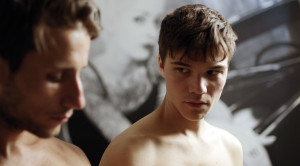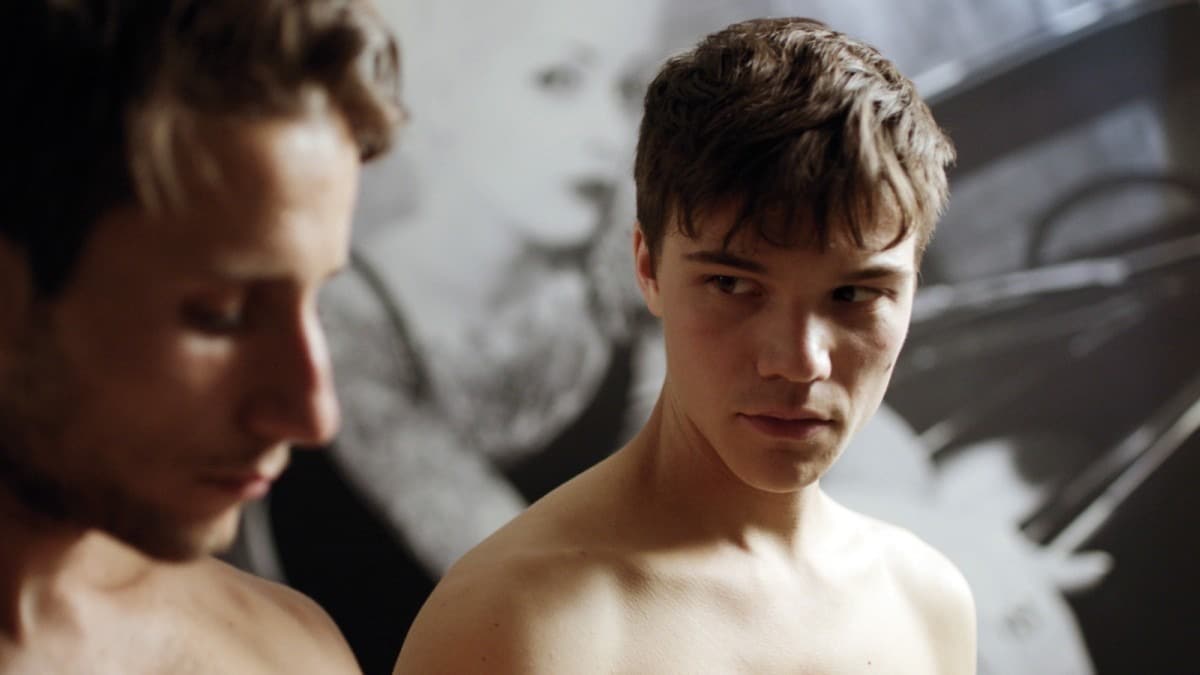The film drama "Stormland" also tells the story of love among footballers, but above all of the difficulties of gay life in conservative, homophobic Hungary. From Axel Schock.

Szabi is a future football star. Not only his father, himself a former professional footballer, but also the young talent's coach are convinced of this. The scout for a first division team has also recognised Szabi's potential. However, Szabi quits. After a botched game with his German team, Szabi simply runs away - back to his Hungarian homeland, where he holes up in the run-down house of his deceased grandparents.
Back in Germany, he not only leaves behind the chance of a possible career, but also his team-mate and best mate Bernard (Sebastian Urzendowsky), with whom he fell out during a row in the changing room.
Fisticuffs in the shower
The team-mates may not have known exactly what triggered these fisticuffs in the shower, but Hungarian director Ádám Császi provides the attentive viewer with unmistakable signals as to what drove Szabi to flee.
It's not just the pressure to perform and the fear of possibly not being able to fulfil the high expectations. It is the testosterone-fuelled aggressive macho society that Szabi can no longer stand - as well as the fear that drives him. The fear that one look, one gesture, one sentence from him could suddenly make her realise that he is not one of them - but that he likes men.
Even if Császi's debut film may sound like it, "Stormland" is not a drama about the media's number one taboo subject - gay professional footballers - but first and foremost the story of a coming-out in a deeply homophobic atmosphere.
Country dream
Szabi and Áron become secret lovers. For on the remote farmstead in the Hungarian province, where Szabi retreats like a hermit and begins to prepare himself, he initially finds an energetic helper in Áron (Ádám Varga) - and after a timid and uncertain phase of rapprochement - a secret lover.
For a moment, the two young men experience a kind of gay country dream. Császi stages it in summery and poetic images, sometimes charged with subtle, sometimes quite direct homoeroticism. Bees are bred and honey is harvested. Sweat runs down their naked torsos as they work on the roof, and in the evening their bodies eagerly fall over each other.
But their happiness is unstable, their relationship uncertain. They have no words for what they want from each other, what they desire, what feelings they have for each other. Or don't dare to say it. But the others talk about them all the more. Szabi's mother, who is in need of care and whom Szabi looks after devotedly, suspects what is going on between the two men and denounces him.
However, the idyll is not only jeopardised by the hostility and resentment of the villagers, but also by a surprising guest. Bernard has travelled all the way from Germany to reveal his feelings for Szabi.
A dreamlike ménage à trois
Bernard has travelled all the way from Germany to reveal his feelings for Szabi. (Photo: Salzgeber Medien)The further the plot progresses, the more apt the film's title proves to be. "Stormland" not only revels in picturesque summer and landscape scenery, it is also full of highly dramatic and violent emotions: Hatred and violence, jealousy and tender feelings of love.
Admittedly, Császi has packed quite a lot into this film, perhaps even a little too much. He even treats the audience to a dreamlike ménage à trois. And of course: there are quite a few other, perhaps more exciting, more surprising coming-out films. But you can't, you mustn't watch "Stormland" without always being aware of the country in which it was produced! It was made in a Hungary where, under the aegis of the national-conservative Fidesz party and Viktor Orbán, not only Christian-nationalist tones have prevailed for four years. But also openly anti-Semitic and homophobic tendencies are at least tolerated, if not encouraged, by the state.
Surprising - disturbing
A Hungary in which the protection of the family was expressly restricted to heterosexual couples by a constitutional amendment in 2013 and where violent attacks must be expected time and again at gay pride demonstrations. And a country in which the government's most important cultural functionary is allowed to openly call for a fight against the "faggot lobby".
If you bear all this in mind, you will see "Stormland" with completely different eyes. And perhaps also take a more nuanced view of the surprising, disturbing ending, which seems so out of step with the times.
"Sturmland" (Viharsarok/Land of Storms). Hungary/Germany 2014, directed by Ádám Csász. With András Sütö, Ádám Varga, Sebastian Urzendowsky. 105 minutes, German-Hungarian original version with subtitles.
"Stormland" will be shown in these cinemas as part of Gay Film Night in November. And that's not all: before the feature film, the Short film from ICH WEISS WAS ICH TU with Barbie Breakout about experiences of marginalisation in the scene can be seen on the big screen.

